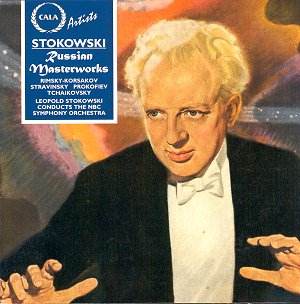After leaving the Philadelphia Orchestra and forming
the All-American Youth Orchestra – soon to suffer because of American
involvement in the War - Stokowski was without an orchestra. Fortuitously
a walkout by Toscanini left the NBC Orchestra looking for a conductor
and so Stokowski was engaged, for three seasons (two of them shared
with the now returned and mollified Toscanini). The first recordings
on this disc, made in 1942, were recorded in an acoustically revamped
Studio 8-H, whilst the Tchaikovsky Symphony and the Prokofiev March
were made in 1941 in the richer acoustic of the Cosmopolitan Opera House,
whilst those same renovations were taking place. Stokowski had recorded
the Rimsky-Korsakov before, in Philadelphia in 1929 and was to do so
again. It’s certainly a galvanizing performance – you can hear the Slavonic
brass writing that must have influenced Janacek so much - and one with
a remarkable trick up its sleeve. Instead of the trombone solo that
represents the priest’s chanting, Stokowski instead employs a beefy
sounding baritone, Nicola Moscona. The original Victor album claimed
this brought "additional tone-colour to the score", a claim
the composer might have been tempted to debate were he around to do
so. Nevertheless, oddities excluded, this is certainly a muscular, no-nonsense
performance a little vitiated on this transfer by somewhat less than
perfect copies. Tchaikovsky’s Humoresque – maybe better known in the
context of Stravinsky’s Fairy’s Kiss ballet, is winningly done though
I’m not sure I really care for the Prokofiev March which is, even in
the circumstances, short on subtlety. Stravinsky was not a composer
much conducted by Toscanini but Stokowski made eight recordings of The
Firebird Suite between 1924 and 1967, which must set some kind of record.
The question of how much is Stravinsky and how much Stokowski will inevitably
arise. Listening to the lyrical outpouring at 1.27 in the Berceuse will
have you checking the CD booklet for confirmation of which composer
you’re listening to. Similarly the Dance of the Firebird tends to seep
too much unalloyed sentiment for its own good. The Infernal Dance is
certainly that, though whether the barely controlled frenzy works to
the Suite’s advantage is, to me, doubtful. His commitment to the works
of living composers was admirable but not always matched by comparable
stylistic insight. As with Stravinsky, Tchaikovsky was not one of Toscanini’s
favoured composers whereas he most assuredly was Stokowski’s. The small
cut of eight bars in the finale was routinely made by the conductor
and by no means as uncommon or as drastic as those made by his colleagues.
He had made a particularly excessive recording of the Symphony in Philadelphia
in 1928 and this NBC performance is certainly nowhere near as questionable
as that. It does, however, contain a sufficiently high amount of gear
changing, tempo-modification, accelerandos and extravagant portamentos
– listen at 6.08 in the first movement to a real case of over ripe sliding
- to cause alarm. With it comes sonorous and expressive playing and
yet more evidence of Stokowski’s vivid personality. But not a Tchaikovsky
for the Library by any means. The notes are excellent, remastering good
but, as I indicated, better sounding copies could have been used.
Jonathan Woolf


